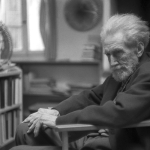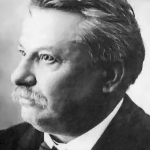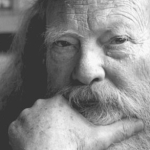Zeus lies in Ceres’ bosom
Taishan is attended of loves
under Cythera, before sunrise
And he said: “Hay aquí mucho catolicismo—(sounded
catolithismo
y muy poco reliHion.”
and he said: “Yo creo que los reyes desparecen”
(Kings will, I think, disappear)
This was Padre José Elizondo
in 1906 and in 1917
or about 1917
and Dolores said: “Come pan, niño,” eat bread, me lad
Sargent had painted her
before he descended
(i.e. if he descended
but in those days he did thumb sketches,
impressions of the Velázquez in the Museo del Prado
and books cost a peseta,
brass candlesticks in proportion,
hot wind came from the marshes
and death-chill from the mountains.
And later Bowers wrote: “but such hatred,
I have never conceived such”
and the London reds wouldn’t show up his friends
(i.e. friends of Franco
working in London) and in Alcázar
forty years gone, they said: go back to the station to eat
you can sleep here for a peseta”
goat bells tinkled all night
and the hostess grinned: Eso es luto, haw!
mi marido es muerto
(it is mourning, my husband is dead)
when she gave me a paper to write on
with a black border half an inch or more deep,
say 5/8ths, of the locanda
“We call all foreigners frenchies”
and the egg broke in Cabranez’ pocket,
thus making history. Basil says
they beat drums for three days
till all the drumheads were busted
(simple village fiesta)
and as for his life in the Canaries…
Possum observed that the local portagoose folk dance
was danced by the same dancers in divers localities
in political welcome…
the technique of demonstration
Cole studied that (not G.D.H., Horace)
“You will find” said old André Spire,
that every man on that board (Crédit Agricole)
has a brother-in-law
“You the one, I the few”
said John Adams
speaking of fears in the abstract
to his volatile friend Mr Jefferson.
(To break the pentameter, that was the first heave)
or as Jo Bard says: they never speak to each other,
if it is baker and concierge visibly
it is La Rouchefoucauld and de Maintenon audibly.
“Te cavero le budella”
“La corata a te”
In less than a geological epoch
said Henry Mencken
“Some cook, some do not cook
some things cannot be altered”
’Iugx. . . . . ’emòn potí dwma aòn andra
What counts is the cultural level,
thank Benin for this table ex packing box
“doan yu tell no one I made it”
from a mask fine as any in Frankfurt
“It’ll get you offn th’ groun”
Light as the branch of Kuanon
And at first disappointed with shoddy
the bare ram-shackle quais, but then saw the
high buggy wheels
and was reconciled,
George Santayana arriving in the port of Boston
and kept to the end of his life that faint thethear
of the Spaniard
as grace quasi imperceptible
as did Muss the v for u of Romagna
and said the grief was a full act
repeated for each new condoleress
working up to a climax.
and George Horace said he wd/ “get Beveridge” (Senator)
Beveridge wouldn’t talk and he wouldn’t write for the papers
but George got him by campin’ in his hotel
and assailin’ him at lunch breakfast an’ dinner
three articles
and my ole man went on hoein’ corn
while George was a-tellin’ him,
come across a vacant lot
where you’d occasionally see a wild rabbit
or mebbe only a loose one
AOI!
a leaf in the current
at my grates no Althea
______
libretto
______
Yet
Ere the season died a-cold
Borne upon a zephyr’s shoulder
I rose through the aureate sky
Lawes and Jenkyns guard thy rest
Dolmetsch ever be thy guest,
Has he tempered the viol’s wood
To enforce both the grave and the acute?
Has he curved us the bowl of the lute?
Lawes and Jenkyns guard thy rest
Dolmetsch ever be thy guest
Hast ’ou fashioned so airy a mood
To draw up leaf from the root?
Hast ’ou found a cloud so light
As seemed neither mist nor shade?
Then resolve me, tell me aright
If Waller sang or Dowland played
Your eyen two wol sleye me sodenly
I may the beauté of hem nat susteyne
And for 180 years almost nothing.
Ed ascoltando al leggier mormorio
there came new subtlety of eyes into my tent,
whether of the spirit or hypostasis,
but what the blindfold hides
or at carneval
nor any pair showed anger
Saw but the eyes and stance between the eyes,
colour, diastasis,
careless or unaware it had not the
whole tent’s room
nor was place for the full EidwV
interpass, penetrate
casting but shade beyond the other lights
sky’s clear
night’s sea
green of the mountain pool
shone from the unmasked eyes in half-mask’s space.
What thou lovest well remains,
the rest is dross
What thou lov’st well shall not be reft from thee
What thou lov’st well is thy true heritage
Whose world, or mine or theirs
or is it of none?
First came the seen, then thus the palpable
Elysium, though it were in the halls of hell,
What thou lovest well is thy true heritage
What thou lov’st well shall not be reft from thee
The ant’s a centaur in his dragon world.
Pull down thy vanity, it is not man
Made courage, or made order, or made grace,
Pull down thy vanity, I say pull down.
Learn of the green world what can be thy place
In scaled invention or true artistry,
Pull down thy vanity,
Paquin pull down!
The green casque has outdone your elegance.
“Master thyself, then others shall thee beare”
Pull down thy vanity
Thou art a beaten dog beneath the hail,
A swollen magpie in a fitful sun,
Half black half white
Nor knowst’ou wing from tail
Pull down thy vanity
How mean thy hates
Fostered in falsity,
Pull down thy vanity,
Rathe to destroy, niggard in charity,
Pull down thy vanity,
I say pull down.
But to have done instead of not doing
this is not vanity
To have, with decency, knocked
That a Blunt should open
To have gathered from the air a live tradition
or from a fine old eye the unconquered flame
This is not vanity.
Here error is all in the not done,
all in the diffidence that faltered . . .







Comment form: